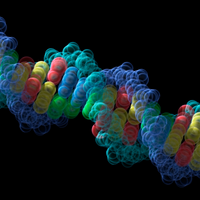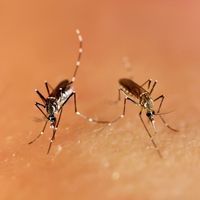Login
Subscribegenetics & genomics

Eight Proteins Turn Mouse Stem Cells into Egglike Cells
Ashley Yeager | Dec 16, 2020 | 3 min read
The identification of the transcription factors that elicit oocyte growth will aid reproductive biology research and might help women with fertility issues, scientists say.

Key Genes Related to Severe COVID-19 Infection Identified
Max Kozlov | Dec 14, 2020 | 3 min read
Differences in the expression of genes associated with antiviral immunity and lung inflammation may contribute to a more serious COVID-19 infection.

Humans Domesticated Yeast Through Bread-Making: Study
Max Kozlov | Dec 11, 2020 | 4 min read
Over centuries of cultivating Saccharomyces cerevisiae to make dough, bakers have put selective pressure on the species, causing it to diverge into two distinct groups, according to the authors.

Gene Therapy in One Eye Improves Vision in Both Eyes
Abby Olena, PhD | Dec 11, 2020 | 4 min read
It’s not clear why the patients with Leber hereditary optic neuropathy, a mitochondrial disorder that causes blindness, also experienced the modest benefits in their untreated eye.

Distinct Microbiome and Metabolites Linked with Depression
Rachael Moeller Gorman | Dec 9, 2020 | 4 min read
The gastrointestinal tracts of people with major depressive disorder harbor a signature composition of viruses, bacteria, and their metabolic products, according to the most comprehensive genomic and metabolomic analysis in depression to date.

Genetic Reprogramming Restores Vision in Mice: Study
Max Kozlov | Dec 6, 2020 | 5 min read
Researchers repaired what is otherwise irreversible damage in the animals’ ocular neurons, by activating transcription factors ordinarily used to generate induced pluripotent stem cells.

Initiative Addresses Racial Disparities in Neuroscience
Amanda Heidt | Dec 1, 2020 | 4 min read
The African Ancestry Neuroscience Research Initiative plans to boost inclusion in genomic studies and support a more diverse generation of neuroscientists.

Immune Genes Protect Cells from Ebola Virus and SARS-CoV-2
Rachael Moeller Gorman | Dec 1, 2020 | 3 min read
A pathway involved in the adaptive immune system, a relative newcomer in the world of pathogen defense, may have a more ancient role in protecting cells from invading viruses.

SARS-CoV-2 Genetic Variant May Be More Transmissible
Abby Olena, PhD | Nov 25, 2020 | 4 min read
The so-called 614G mutation in the viral spike protein does not appear to cause more severe cases of COVID-19, but multiple studies indicate that it could be more contagious.

Q&A: How Animals Change in Space
Jef Akst | Nov 25, 2020 | 4 min read
Weill Cornell Medicine geneticist Christopher Mason speaks with The Scientist about a bolus of new work on the physiological, cellular, and molecular effects of leaving Earth.

COVID-19 Research Biased Toward Only a Handful of Genes
Amanda Heidt | Nov 24, 2020 | 5 min read
Thomas Stoeger of Northwestern University has previously studied scientists’ limited focus on certain genes. In a new study, he shows how these same behaviors extend into the science of COVID-19.

Mosquitos in Asia and the Americas More Susceptible to Zika Virus
Abby Olena, PhD | Nov 19, 2020 | 4 min read
A study explains how Zika was present among mosquitoes in Africa for decades without causing the harm to human health seen outside the continent in recent years.

Giant Viruses Can Integrate into the Genomes of Their Hosts
Amanda Heidt | Nov 19, 2020 | 4 min read
Rather than introducing small chunks of DNA as other viruses do, some giant viruses can contribute more than 1 million base pairs to a host’s genome, broadening the ways in which viruses may shape eukaryote evolution.

Q&A: Minks Can Transmit SARS-CoV-2 to Humans, Study Shows
Max Kozlov | Nov 13, 2020 | 4 min read
Whole genome sequencing of the virus infecting the farm animals showed that it spread from the workers to the mink and back, indicating that an animal could serve as a viral reservoir.

Q&A: A New Tool for Ensuring Genetic Privacy
Amanda Heidt | Nov 12, 2020 | 6 min read
Gamze Gursoy and Mark Gerstein of Yale Medical School have developed a strategy for stripping identifying variants from functional genomic data, balancing privacy with utility.

Regulators of Gene Activity in Animals Are Deeply Conserved
Amanda Heidt | Nov 6, 2020 | 5 min read
Enhancers, short regions of DNA that direct gene expression, of species separated by 700 million years of evolution worked interchangeably, according to a new study.

Denmark to Cull 17 Million Mink Amid SARS-CoV-2 Mutation Concerns
Lisa Winter | Nov 5, 2020 | 2 min read
Government authorities say because the animals are good hosts of the novel coronavirus, and this new viral variant could undermine vaccine efforts against COVID-19, they are destroying the nation's entire stock of mink.

Cell Biologist Angelika Amon Dies at 53
Max Kozlov | Nov 4, 2020 | 3 min read
A “larger than life personality,” Amon devoted her career to studying the cell cycle and aneuploidy. Her research has shaped the field of cancer biology.

How a Centipede Survives its Own Species’ Venom
Shawna Williams | Nov 1, 2020 | 2 min read
The same toxin targets different receptors in prey and conspecifics to deliver either a lethal or non-lethal blow.
